Issue 12 | Fall 2019
Dear friends,
Fall often feels like a time for reflection – as the leaves turn and the air gets crisper, we are reminded that the only constant in life is change. At Roca, that’s what we hope to give young people all year round and every day – opportunities to reflect; chances to begin anew.
And inside Roca, we’ve certainly been reflecting: looking, learning, refining, and figuring out how to get better at what we do for the young people we serve.
As psychiatrist and systems change expert Dr. Alisha Moreland-Capuia writes, “[We] need to view violence and risks for violence from the lens of unmet need, unaddressed trauma, lack of connection and understanding.”
We agree. After 31 years, here’s what we have learned: young people need unconditional love, consistency, and safety. They need to be able to trust others to navigate or heal from trauma. They need to be able to make mistakes, learn from them, and try again. And they need us to keep showing up for them, even when they fail. Only then can they can drop their guns; finish their education; keep a job; or become the parents they want to be.
So we never give up on young people. We do relentless outreach and build relationships to create safety and stability. We use cognitive-behavioral theory (CBT) to break through their fear and directly address the hurt and anger that causes urban violence. We then provide a network of tools designed to meet them where they are and exercise new emotional muscles everyday — like daily CBT; paid job skills training to help them earn income and practice a daily routine; parenting education that’s fun for both parent and child; and peacemaking circles to connect deeply with their community —all which you can learn more about here.
This Fall and always, Roca’s hope is that we can provide our young people with a better path to walk, where every next positive step creates a ripple effect in our communities. We don’t ask that they graduate from college tomorrow. For now, we ask that they walk with us on a difficult but important path to think differently, choose consciously, and live peacefully. We want for them what we all have on a good day – ordinary and happy lives.
We feel so lucky that you, and so many young people – more than 1,300 over the last year – have chosen to walk with Roca. Thank you for your continued partnership and support for our young people, who give us hope in new beginnings every day.
Warmly,
Molly Baldwin
Founder & CEO

NIC RECOGNIZES ROCA FOR IMPLEMENTATION OF EVIDENCE-BASED PRACTICES
We are thrilled that the National Institute of Corrections (NIC) has cited Roca as a model for implementing evidence-based practices in work with our highest-risk and hardest-to-reach young people. A 2017 article authored by Roca and published by the Harvard Kennedy School’s Executive Session on Community Corrections is listed by the NIC as a “top-shelf” resource for evidence-based practice implementation. Read more here.
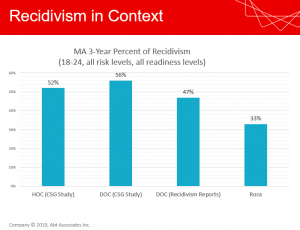
UPDATES ON OUR YOUNG PEOPLE’S SUCCESS
An external evaluation by Abt Associates has revealed that Roca young men age 18-24, after 3 years, have a recidivism rate of 33%, which is roughly 20% less than HOC and DOC rates gathered for all risk levels, not just the highest-risk group that Roca serves. Learn more here.
What’s more is that when they our young people have recommitted, it’s for less violent crimes—only 16% of those who went back to jail did so for violent crimes, which you can learn more about here. In addition to staying out of jail, they’re getting jobs: 77% of participants enrolled 21+ months were placed in unsubsidized employment positions, and 64% were able to hold down a job for at least a year.
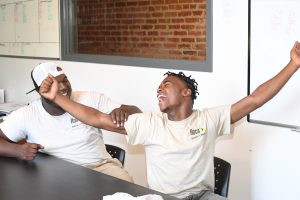
NEW ROCA BALTIMORE REPORT SHOWS FIRST YEAR DATA
We finished a strong first year of Roca in Baltimore, a city of hardworking and dedicated individuals fighting urgently for change. (Baltimore currently faces roughly a murder a day, on average, and three non-fatal shootings a day.) In the past year, Roca made 13,000 outreach efforts trying to find 327 young people. Although a large number of young people – 186 – were found ineligible for our model this first year (due to being incarcerated long-term or not having valid contact information), we successfully 95 of the highest-risk, hardest to reach young men with our intensive, trauma-informed programming, as planned. As always, we were relentless: in the case of one young man, Roca staff reached out 112 times before he agreed to come to programming!
We know the change process takes time, but it also takes cooperation and partnership with police and other law enforcement agencies. The police in Baltimore have been exceptionally open to Roca – in fact, they were our lead referral partner (comprising 71 percent of youth referrals) – and served as a key resource for identifying and locating the hang out areas of young men driving violence in the city. In the coming fiscal year, Roca Baltimore expects to grow to serve 175 young people intensively. Watch some videos on Roca Baltimore here.
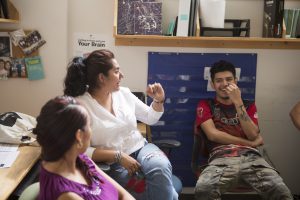
CBT: KEY TO BEHAVIOR CHANGE
In telling the story of how they changed, Roca’s young people consistently credit Roca’s mobile, simplified version of Cognitive Behavioral Therapy (CBT) – taught by our youth workers not only at Roca but in cars, coffee shops, and on the street.
Mobility and accessibility – that is what makes Roca’s version of CBT so effective. We get that young people in the toughest situations often aren’t ready to engage long enough or deeply enough in complex curricula and tend to refuse traditional therapy in clinical settings.
Through the teaching and modeling of 7 core emotional skills, Roca’s CBT-based intervention and approach to youth work provides critical life-saving information that helps young people address trauma; disrupt their “think-feel-do” cycles before violence occurs; clarify their distorted thinking patterns; and take control of their lives.
Preliminary results have shown that Roca participants who practice CBT skills have almost 70% more total days at Roca compared to those who did not practice any CBT skills, and almost 280% increased chance of obtaining a job. These are key factors in preventing recidivism.

PARSNIP PANEL WITH CONGRESSMAN JOE KENNEDY, ATTORNEY GENERAL MAURA HEALEY, AND DAVID GERGEN
Congressman Joe Kennedy III, Attorney General Maura Healey, and Roca Youth Worker Victoria Ramirez-Morales spoke on November 7 at a Roca panel on Immigration, Trauma, and Central American Youth at Parsnip restaurant in Harvard Square.
Moderated by Harvard Kennedy School Center for Public Leadership Founding Director David Gergen, the panel spoke around their own experience with visiting the border, as well as family separation here in Massachusetts. Ramirez-Morales spoke of her own experience coming here, and the trauma that the young men she works with face before they arrive at Roca. She also spoke of the various tools Roca uses to help the youth heal their trauma—peacemaking circles in the high schools, and the use of Cognitive Behavioral Theory (CBT). We use CBT curriculum to teach our young people to think different in order to act different—allowing them to develop emotional literacy to overcome behavioral barriers so they can build skills and lead fuller lives.
Thank you to Congressman Kennedy, Attorney General Healey, David Gergen, and Victoria Ramirez-Morales for your participation and support of Roca!
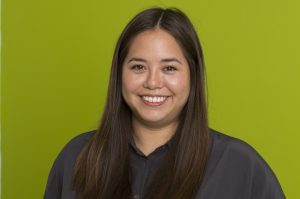
AN OP-ED IN THE LYNN ITEM FROM ROCA’S EMILY FISH
Roca Lynn’s own director and youth worker, Emily Fish, recently had an op-ed published in the Lynn Item featuring two young men from Lynn who have gone through the Roca program and have successfully turned their lives around for the better. Check it out online.
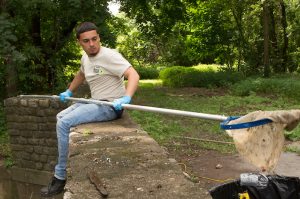
SPOTLIGHT: ROCA YOUNG MAN
“If I really wanted to, I could [be back in the streets], but I know my decision is to stay here because I don’t want to get in trouble and be locked up. I’ve made too much progress—I can’t go back now.”
At Roca, we know the path to stability and independence is never a straight line. The fact that Henry today works a stable job and has logged 1,000+ hours of programming at Roca is nothing short of extraordinary. His story is one of hard work and resilience, but a lot has threatened to disrupt his progress along the way.
“I was all over the place” is how Henry describes himself when he first came to Roca. At 14, he dropped out of high school and was in and out of DYS custody: “I had distanced myself from my friends and was on the streets, hustling, getting in trouble, stealing cars”. In 2017, Henry’s DYS worker, a former Roca staff member, referred him to Roca. Read the full profile here.
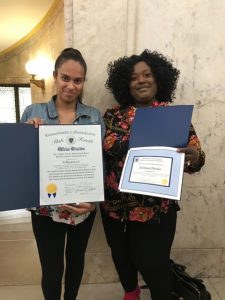
SPOTLIGHT: ROCA YOUNG MOM
Below is a speech from a Roca Young Mom at Springfield City Hall on November 7. Thank you DTA for your partnership!
My name is Zorimary Davila. I enrolled into the Roca Young Mom’s Program nine months ago. I came to the Roca Young Mom’s Program four months pregnant and did not have a clue as to what I was going to do.
Although, I had many issue and challenges that I was dealing with in my life at the time, the Roca Young Mom’s Program helped me in many different ways, but the most important issue was housing. Not long after I enrolled into the Roca Young Mom’s Program, they were able to help secure housing for me. That within itself relieved a whole lot of stress that I was dealing with. Having secured housing, allowed me to focus on my goals. My short term-goal is to acquire my Hi SET then to go on to train to become a CNA. I was able to work on my HiSET because Roca helped me get connected to DTA which helps me me support myself so I can focus on taking classes. Roca works closely with my DTA case worker. My long-term goal is to eventually one day become an anesthesiologist. The Roca Young Mom’s Program has been a great benefit to my life.
I contact my teacher and/or my youth worker every single day for a ride to the Roca building because I get an awful lot from going there. By going there as often as I can, I am able to spend more time on studying to pass my HiSET and by learning about CBT, it has given me the tools to use and manage different emotional issues that I may encounter. I like coming to class for the education that I receive and also, my teacher is positive and a very encouraging person. I definitely could use all the positive energy and encouragement I can get. Through coming here, I have been able to redirect my life in a positive way for not only my future but for my children’s future’s as well. I want to thank DTA for that too and for working with Roca to help mothers like me.
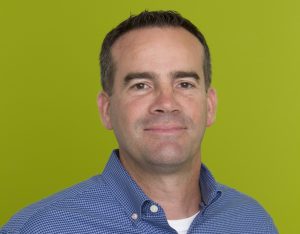
ORGANIZATIONAL UPDATES
As part of our reflection this Fall, we’ve been diving into our work and deciding what is most of value to our young people and what isn’t – which has led us to double down on CBT, and re-focus our theory of change to meet the needs of our current population. We’ll share more about these changes in our Annual Report in the New Year.
We’ve also continued to build our capacity and grow our presence around Massachusetts. Our COO, Scott Scharffenberg, was appointed the new Roca Massachusetts Executive Director to lead this work across the state. Scharffenberg will oversee operations in five locations, the implementation of the Roca intervention model and services, and lead efforts to grow Roca’s outreach to those that are the highest risk and hardest to reach.
“It’s an extraordinary privilege to know and work with the young people we serve. Second only to that, is the gift of working with a remarkable team of people who are also committed to serving young people with the hope that, in some small way, together we can promote justice and opportunity for everyone,” said Molly Baldwin, Roca Founder and CEO. “I have been deeply honored to lead the work in Massachusetts for just over 31 years and, as we expand our work to other places, I am thrilled to partner with Scott as he takes on the leadership of our work here.”
Finally, we’ve continued to build out our Board of Directors. This year, we’ve welcomed Adrian Dingle, a former NFL player and former youth football coach; Jay Ash, President and CEO of the Massachusetts Competitive Partnership; Michael Davis, Associate Vice President of Public Safety for Northeastern University; Ethan Berkwits, Senior Editor and Content Strategist at Brown Advisory; and Thaddeus Miles, Director of Community Services at MassHousing. Existing board members include: Stew Chapin, Trustee at the Bennett Family Foundation; Christine Kendall, Founding Partner at SmarterGive; Maggie Moore, Former Vice President at Goldman Sachs; Dwight Robson, Chief Public Strategy and Marketing Officer at the MENTOR Network; John Shue, Managing Director of Private Equity at Harvard Management Company; and Greg Torres, Chairman of the Board at MassINC.

Young Men and Young Mothers are making positive changes in their lives because of you. Each year during the Holidays we try and provide a gift for our young men and women. We would appreciate your contribution to Roca’s Holiday gift drive by purchasing one of the items on a wish list we have created here. We will be distributing the gifts during the Holiday parties for the young men and women in December.
Many of our participants are without family and we like them to feel as if they are not alone and forgotten during the Holiday season.


